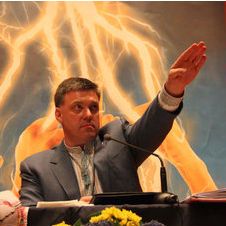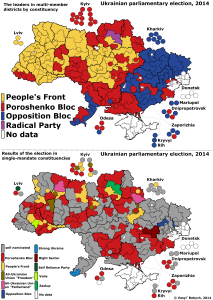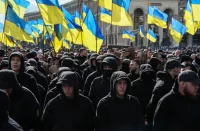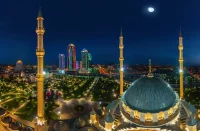The Ukrainian Svoboda political party, whose leader Oleg Tyagnybok is known for his implacable contempt for the people like «Moskals» (derogatory for Russians), «Yids» (a Jewish slang ethnonym of Yiddish origin) and «Lyakhy» (the old Ukrainian exonym for the Poles), failed to reach the threshold level needed to get into the parliament. These are two things to be taken into account before any explanation of what happened is offered: 1) the number of seats for contenders had been defined before the election; 2) those who take part in the decision making process found it important to show that fascism is out of mainstream politics in the contemporary Ukraine.

One way or another, announced election results were intriguing. All of a sudden the Petro Poroshenko Block happened to lag behind the People’s Front led by Prime Minister Arseniy Yatsenyuk. The Radical Party headed by Oleh Lyashko, almost unanimously predicted to be the second runner before, unexpectedly «shrank» giving the way to the new political force Samopomosh (Self-help), the party formed by Andrey Sadoviy, the mayor of Lviv in western Ukraine, which was a big success in the race. The most unexpected surprise was the defeat of Svoboda, which was expected by polls, to easily overcome the 5% threshold to enter the parliament.
Tyagnibok and the Svoboda members said the partners let them down and betrayed Ukraine. They made known their intent to storm the building of Central Election Committee but the threats never came to fruition.
Of course there were reasons for the Svoboda’s failure. It happened to unstable political parties, constantly changing their political orientation. For instance, the Socialist Party supported Yushenko in 2004 to swing over to Victor Yanukovych two years after. The same thing happened to the People’s Party led by Vladimir Litvinov, the political force called the servant of all masters.
The Social-National Party, that changed its name for Svoboda in 2010, cooled down the radical sentiments as they stopped to bring in any dividends. It happened as the spin doctors of the ruling Party of Regions started to prepare Oleg Tyagnibok, the leader of Svoboda, for the role of sparring partner of then President Yanukovych as he was getting ready for another presidential election campaign in 1915. The deal with Victor Yanukovych cost him the support of many ultra-nationalists. Even as the preparations for the coup were in full swing, Tyagnibok appeared to be the most cautious in contrast with other leaders of the Maidan movement. As a result, he ultimately lost the support of radical voters but made some new moderate nationalists swing to his side. As Crimea was lost and the punitive action in Novorossia started, Svoboda adopted more aggressive rhetoric to make the above mentioned, to turn away moderate forces from Tyagnybok while the ultras never came back to his support as they found new idols to follow.

By 2010 Svoboda changed the sources of fund raising. Instead of limited contributions from small and medium business in Western Ukraine and the profits made by providing «krysha» (the protection a criminal group offers to a businessman in an exchange for paying extortion money) financial flows were poured on the party by the oligarchs that belonged to the Party of regions. It was part of the «Easy Win» plot aimed at guaranteeing Yanukovych another presidential term. As Yanukovych was overthrown the flow stopped but two years in parliament gave Svoboda a chance to find the sources of funding among moderate nationalists making money in business. Soon the latter swung to more promising candidates like Yatsenyuk and Poroshenko. It made the Svoboda’s financial support shrink before the race. By and large the West treated the three Maidan movement leaders equally at the beginning, then Europe decided to bet on Klitschko, the United States threw its support behind Yatsenyuk as Tyagnybok was left out in the cold.
There was another important, if not decisive, reason to prevent Svoboda from winning. Washington and Brussels did not want the Ukrainian parliament to have any relation to fascist ideology, at least visibly. So the Nazi were divided among other political parties, perhaps, excluding the Opposition Block. Some of them, including the ideologists of Svoboda and Dmitry Yarosh, the leader of terrorist party Pravy Sector, came first in constituencies. But Svoboda militants failed to make the cut at the party election list and were left outside of the parliament. That’s what makes them talk about the partners’ betrayal.
See also: Ukraine: Elections without Voters.
In reality nobody betrayed anyone; the Tyagnybok-led Neo-Nazi party won’t leave the corridors of power. After the coup many of its members found cozy places of second and third rate bureaucrats in various strong agencies. Some have become key figures.
For instance, Yuri Mykhalchyshyn, a well-known admirer of Hitler and Mussolini, one of ideologists of Ukrainian fascism, changed his seat in parliament for the position of deputy head of Ukraine’s Security Service responsible for analysis and ideology. There will be nothing to be surprised about if Oleg Tyagnybok becomes an important executive power official.
See also: Kiev Elections Can’t Sanitise State of Mob Rule.
The former Social-Nationalist Party has failed to make it to the parliament but it has not vanished from the political scene. According to covert collusion, it has gone out of spotlight to conceal the fascist substance of Ukrainian regime and to let its overseas sponsors save face.
Source Strategic Culture Foundation














Pingback: Is Tyagnibok thwarting US-EU agenda for Ukraine? #WakeUp http://orientalreview.su/?p=9079 | Protestation
Nationalists in Ukraine do their job, that’s all. They didn’t succeed in the east and they turned at unarmed and innocent people, at none-Ukrainians for the most part. Some oppressed by force, some economically like my family. It happened so we are not a part of Great Ukrainian nation, originally we are from Slovakia, and we wanted to use our right of succession in Ukraine, but country’s authorities turned down our request because we are none-Ukrainians and soon all of our kind will become none-citizens with no rights, and the property, bank accounts, etc. will be taken by Ukrainian state that will distribute everything among those who participate in the ATO in the east. In fact nationalist government robs us and by doing so they try to solve social and economic problems in Ukraine while we are facing indifference, threats, aggression because of our ethnic origin.